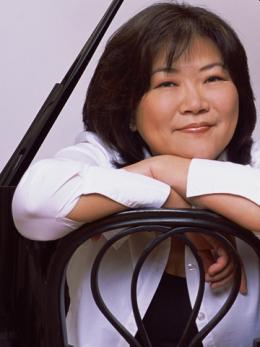by Jarrett Hoffman

“Moonlight”
“Resurrection”
“Trout”
What looks like a dramatic poem about fish is actually a list of four famous nicknames of classical works. And everyone loves a nickname: they’re not always important to think about, but they’re always fun.
Oberlin Conservatory piano professor Angela Cheng and I recently talked about Mozart’s “Elvira Madigan” Concerto (No. 21 in C), which she’ll perform with the Akron Symphony and conductor Christopher Wilkins on Saturday, September 29 at 8:00 pm at E.J. Thomas Hall. The program will also include Tchaikovsky’s Capriccio italien and Rimsky-Korsakov’s Scheherazade.
As with many nicknames, the composer had no hand in “Elvira Madigan.” That sprung into being thanks to the 1967 Swedish film of the same name, which tells the story of a Danish tightrope dancer, and famously features the slow movement of this Concerto.
“I don’t actually know the movie — I should really see it one day — but in any case the name is a good way to distinguish it from Mozart’s other C-major concertos,” Cheng said over the phone. “And I’m glad that the piece is more well-known because of that.”
Musically, what makes the work stand out to her? “First of all, the second theme of the opening movement is really very beautiful. This is also one of the great virtuosic concertos. And the key of C major was very bright in Mozart’s time — the C-major that comes later, Köchel 503, is another big, virtuosic concerto for the keyboard.”
Cheng feels there’s a good reason why people love the second movement, in addition to its use in the film. “It has a very haunting melody with these murmuring triplets in the left hand and in the orchestra. And as simple as it is, it’s so expressive. With so few notes, it says so much.”
The finale is “pure happiness,” she said. “It’s just infectious — the theme, the character, and the fantastic writing for both piano and orchestra. It’s joyful, and full of life. I think it’s something that can really lift one’s spirits when one plays it or hears it.”
Cadenzas are often scary to play, but in this piece the challenge is different. “Unfortunately Mozart didn’t write down his cadenzas for this concerto,” Cheng said. And as much as she loves the piece, that’s always given her some trepidation. “Should I compose something myself? Would it be good enough?”
When considering cadenzas for the work, she always comes back to the world of Mozart. “I want to make sure the range doesn’t go beyond the piano that he had. And harmonically, I don’t want it to be too foreign to his vocabulary.” It wasn’t easy, but Cheng has found cadenzas she’s happy with, drawing on ones by other players — plus “a little bit of my own.”
Aside from cadenzas, smaller connective moments in the Concerto offer additional freedom. “They’re just little improvisations on the long fermatas that take us into the bridge and into the theme,” Cheng said. “I think it’s part of the style of the time that you wouldn’t play a long note and not do something with it. I took the liberty of adding just a few things.”
We closed our conversation on a very different topic: parenting. Growing up, Cheng was discouraged by her family from going into music; many years later, her own children resisted the opposite push from their pianist-parents. (Cheng is married to Alvin Chow, a fellow piano professor at Oberlin.)
“I’m a failed tiger mom,” Cheng said with a laugh. “My kids did play the piano, but unfortunately they didn’t keep up with it. They just didn’t want to practice so much, and somehow I couldn’t bribe them or force them. But they love music — it’s in their blood. They still play occasionally for fun, and they also sing a lot.”
One daughter, a recent Oberlin alum who majored in neuroscience, sang in Nothing But Treble, an all-female a cappella group at the school. Following largely in her footsteps is her sister: a current Oberlin student and member of Nothing But Treble, but a biochemistry major.
Cheng is glad music is a part of their lives, though she admits she was sad when they stepped away from the piano. “I think they’re talented, but music is also a very competitive world, and it’s so subjective — science is more exact, more right or wrong. Maybe in the long run, it’s best they don’t have to go through that. They enjoy their sciences and enjoy knowing much more than their parents do.” She laughed. “It’s all worked out. And they’ll be concert-goers, so that’s a good thing too.”
Published on ClevelandClassical.com September 24, 2018.
Click here for a printable copy of this article



